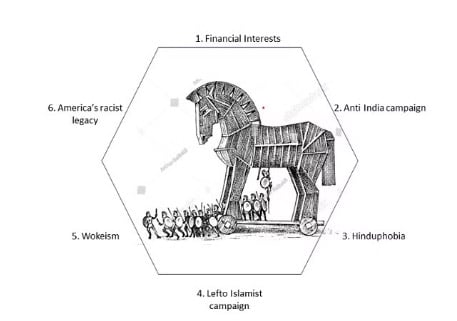California’s Trojan Horse Caste Bill damages reputations of Indian Americans on unfounded grounds
California resident Milind Makwana breathed his last outside Cupertino city council, fighting the caste bill SB403. In his haunting speech, the Dalit American leader compared the onset of caste-based legislation in California to a shiny disco ball on a weekend whose shimmer would not last until Monday morning.
In a way, he called it a Trojan Horse — a bill that claims to be a benign champion of civil rights, but brings harm to Indian Americans, to California businesses, and sullies the cornerstone Unruh Civil Rights Act of 1964.
On 28 August 2023, California assembly passed the contentious and controversial caste bill SB403, which amends the Civil Rights Act 1964.
The bill’s author, state senator Aisha Wahab, acknowledged that existing law covers for caste discrimination but ignores Hindu voices who are requesting that the word “caste” be kept out of the Civil Rights Act, given that the legacy of “colonial caste” would single out Indian Americans as a minority group that required additional policing.
‘Progressive’ Democrats tarnishing Indian Americans
Indian Americans heavily lean Democrat and were disenchanted with their lawmakers’ declaring caste as a real problem, without evidence. The bill had strong push from the upper echelons of the ‘Progressive’ Democrats, and credit goes to the usually placid, apolitical Hindu Californians and their grassroots resistance that the assembly ‘ayes’ narrowed to a 62.5 per cent majority — sombre, compared to the whopping 97 per cent majority on the Senate floor just a couple of months ago.
Wahab initially gloated that her bill “had hit a raw nerve” among “guilty” Indian Americans, mocking her opponents. She, sidestepping all decorum and without proof, spoke in the Senate of rampant caste-based rapes and murders in California. While most Hindus and Sikhs opposed the bill, she cheekily tweeted a picture of her with anti-India separatists, as meeting Indian Americans, while ignoring requests from anti-bill advocacy groups.
‘O Unhappy Citizens, What madness’ – Virgil’s Aenid
Wahab relented after repeated requests, but her callousness has not gone down well with her constituents, who are now working on a “Recall Wahab” campaign supported by diverse ethnic groups. If successful, this could force her to resign.
In the past four months of pushback, 65 mentions of caste were removed, and words like Dalit and South Asian were deleted from SB403. Finally, “caste” was moved from a stand-alone category in the Civil Rights Act to a sub-category under ancestry. Wahab stayed adamant on including the racially loaded term “caste”. “Rather perplexingly,” declared Tom Clarke, legal consultant on the bill, as Senator Wahab refused to settle for less triggering replacement like “socially inherited status”.
Trojan Horse Caste Bill
The reason for caste legislation in California is not rampant caste-induced crimes. We explore the underpinnings and drivers of the Trojan Horse caste legislation below.

As the richest ethnic minority in the US, Indian Americans have recently been labelled as White-Adjacent Upper Caste by the Leftists, ignoring their colonial antecedents as colonised slaves before 1947. They are targeted on social media with caste slurs. But despite the US’ long-standing tryst with anti-Asian racism, like the Chinese Exclusion Act of 1882, Japanese internments during WWII, or the eugenics-inspired Asian Exclusion Act of 1924, it could be just one of the minor influencing factors.
‘The horse, Odysseus led up into the citadel as a thing of guile’ – Virgil
Wahab’s comrade in arms, Equality Labs founder Thenmozhi Soundararajan, is a self-confessed sponsor and co-author of the bill. Her highly Hindu-phobic comments, concocted caste survey, and links with anti-India elements are all over social media. Hindu Americans are alarmed to see Wahab cosy up to her as they have seen her bigoted videos spouting hate such as, “Hinduism is ‘a spiritual foundation for slavery with violent scriptures” and “Nazis aren’t Germans — they’re actually Upper Caste Indians.”
Conversely, her anonymous anecdotes of anti-Dalit violence lack proof, with zero police complaints. Lawsuits like Cisco and BAPS have unravelled after three years with signs of serious prosecutorial abuse, fabrication of evidence by California state’s Civil Rights Department (CRD), and even intimidation and coercion of Dalit craftspeople in the BAPS case.
This represents systemic Hinduphobia.
The Ambedkar-Phule Network of American Dalits and Bahujans (APNADB) has categorically stated that Equality Labs does not represent Dalit voices, and yet, they have not received a seat at the SB403 table. In his final statement, APNADB leader Makwana said, “You are legislating about us, without us.”
Can a sponsor of the caste bill be allowed to benefit from diversity workshops on caste? And can a supporter of the bill, the American Bar Association (ABA), benefit from the litigious environment around caste? These are valid questions as earlier bills like SB1038, caused the CRD to become a tyrannical litigation machine — gunning after Activision, Tesla, Riot Games, Cisco, and other corporates, destroying arbitration processes and arm-twisting companies for huge settlements, so much so that CRD’s two main prosecutors were forced to resign by the governor.
Think tanks like the California Policy Center and CABIA have issued warnings about CRD’s anti-worker nature, sued by its own workers and many other groups. With CRD appointed as the fox that has to guard the hencoop of caste laws, California’s Orwellian reality is real.
Caste Bill is born out of wokeism
Assembly member Ash Kalra, a ‘Progressive’ Democrat, identified himself as a Hindu for the first time ever at the judiciary hearing, and then promptly threw fellow Hindu Americans under the SB403 bus by voting ‘FOR’ the bill and giving friendly advice that “your battle will be fought in the courts of law”.
“There are legitimate legal questions that are likely going to be answered in the court system,” he said, acknowledging the rancour, division and legal morass caused by SB403. He tacitly acknowledged the unconstitutional bills that ‘Progressive’ Democrats pass. “I passed a lot of legislations in the racial justice act, that I believed in but that are currently challenged in the legal system,” he said.
Kalra was referring to the 2022 case, where a Los Angeles judge overturned the judgment requiring compulsory recruitment of up to three female directors on corporate boards in California, calling it “unconstitutional” and in violation of the right to equal treatment. Judicial Watch announced that a California court ruled unconstitutional the state’s racial, ethnic, and LGBT quota for corporate boards.
Many expect the caste bill to run the same route. Legal recourse may void the bill for being “unconstitutional” as the term “caste” is actively, if not wrongly, taught as a Hindu credo. Second, caste is a multi-layered term that in the legal world could be “voided for vagueness”.
Anti-India project
Before the caste ordinance was passed in Seattle city, Kshama Sawant, a Trotskyite Socialist, also passed resolutions in the city council against India’s Article 370 abrogation, Citizenship (Amendment) Act, farm laws and indulged in general anti-India tirade, branding anyone who challenged her a Hindu Nationalist. Hence, the impact of South Asian politics cannot be ruled out.
This shows in how both the Cisco caste case and BAPS case documents bizarrely mention Modi even though India had nothing to do with these American lawsuits.
The toxic Dismantling Global Hindutva Conference (DGHC) in 2021 openly discussed Indian politics and caste, spewed venom on Hindu last names, and used slurs like “corporate malignant Brahmins” for the Cisco case accused who are now declared innocent by courts. Calling a death knell to Hinduism and Hindutva, this conference was proof that academic Hinduphobia is real as 45-plus universities participated.
An AI-based analysis showed that the DGHC participants consider “Hindutva” as a direct threat to the electoral caste calculus, altering voting blocs in India. This could explain the renewed demand for a nationwide caste census in India, an exercise last conducted in 1931 and why anyone opposing the caste bill in the US is called a “Hindu Nationalist”.
Caste Bill & dangers of Left-leaning identity politics
But there could be bigger fish to fry than India.
The Economist wrote of “the threat from the illiberal left” warning “to not underestimate the “dangers of left-leaning identity politics” while referring to the descent of Critical Race and Critical Caste theory from the hallowed academic hallways to the congressional corridors.
In a pushback to SB403 on the Senate Floor, Sikh American leader Sardar Satnam Singh referred to caste as the weakness that destroyed the riches of India through colonisation: “Great men of all times stated that if you want to destroy a country, simply sow the seeds of the caste system in their society. Bill SB403 is going to sow those seeds of the caste system and is a poison pill laced with honey (of civil rights).”
During Castecon 2023, Jane Elliott, the famous diversity educator, also said the same about “Race”. Race and caste narratives in the US target merit in the US, deepening divisive identities, bringing reservation quotas, and conducting offensive race-based diversity workshops, causing professors and doctors to sue for ‘reverse racism’.
Woke agendas are ignoring California’s real problems
Caste legislation is a manifestation of diverse agendas, but one thing is clear: it has worked its way to damage the reputations of Indian Americans, hitherto known as a model minority.
Caste narratives and rumours have mainstreamed this rogue issue such that teachers are asking Hindu children of their caste while corporates are divided on caste training, and employees feel targeted, as seen at Google.
They pretend it’s a votive offering: this rumour spreads – Aenid, Virgil
Targeting Indian Americans for unproven caste allegations and instituting caste trainings will weaken Silicon Valley.
Woke agendas are ignoring California’s real problems like prohibitive cost of living, homelessness, rising crime, illegal immigration, unionisation and anti-business environment.
Indian Americans need to assess if their blind voting patterns favouring Democrats are worth it, show up at the ballot and work towards becoming a voting bloc as a micro minority immigrant group, stand for office in local politics, and assert their numeric and financial clout as one of the highest taxpayers.
Finally, it is time that Indian Americans, especially Hindu Americans, take time to command and demand political representation and build civic engagement to make the system work in their favour, or at the very least, not against them.
Richa Gautam is founder of Castefiles.com, a US-based advocacy think tank analysing Caste, Race and identity politics in the context of diversity & inclusion. She is a data analyst and research scholar at Center of Indic Studies, Indus University. Asha Jadeja is a Silicon Valley-based entrepreneur, venture capitalist, philanthropist and a ‘change agent.’ She tweets @ashajadeja325. Views are personal.
This article is sponsored by the Motwani Jadeja Foundation.
Photo: Dalit American leader Milind Makwana protesting against Caste Bill SB 403 | Courtesy: Castefiles



